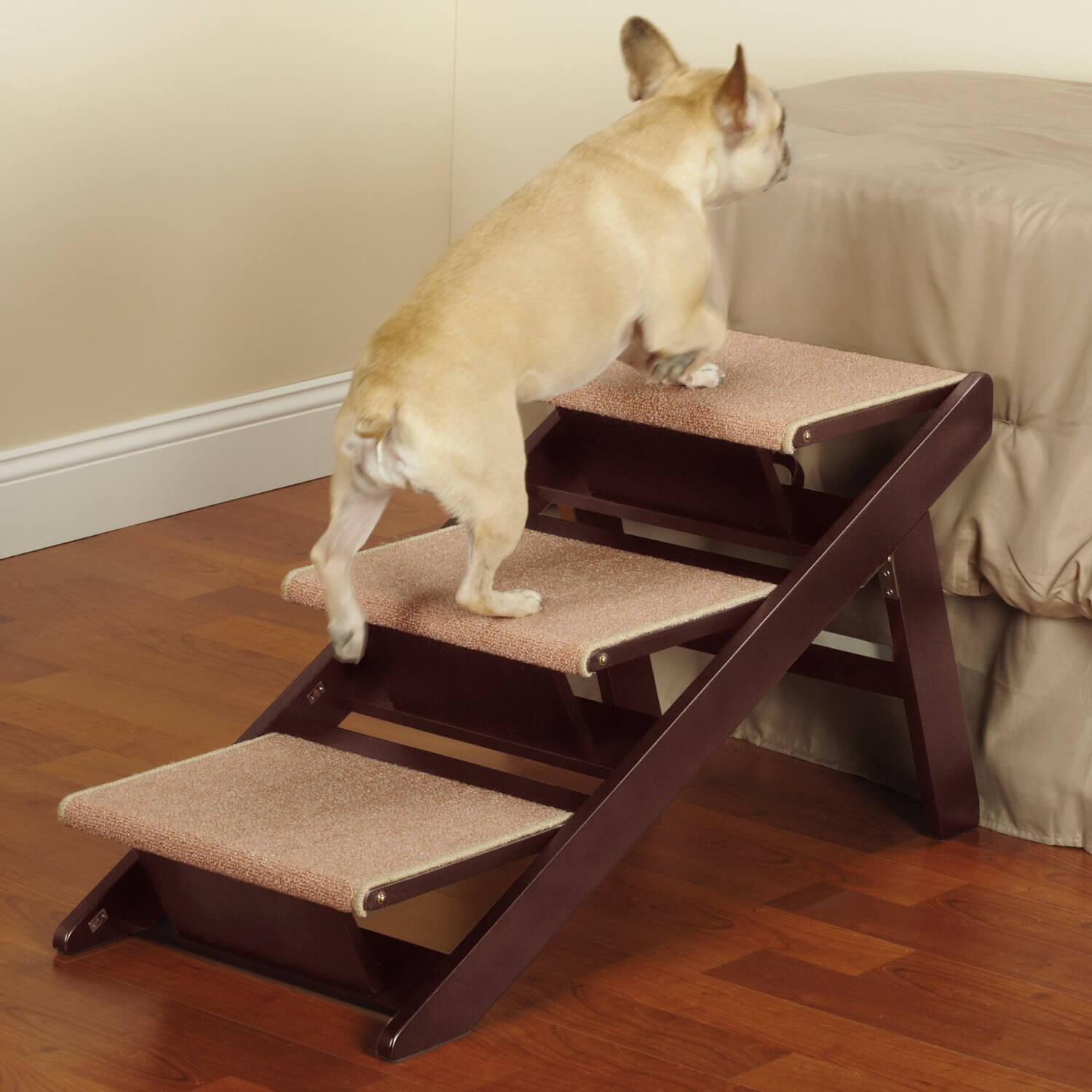Steps for Dogs to Get on Bed: A Comprehensive Guide
Introduction
Dogs, our beloved furry companions, often have a hard time getting on the bed, especially if it's high or they're small. If you're tired of your pup struggling to reach your bedside, this detailed guide will provide you with a step-by-step process on how to help your dog get on the bed safely and comfortably. Get ready to witness the joy on your dog's face as they conquer this everyday challenge.

Source breedingbusiness.com
Teaching Your Dog the Basics
1. Start with a Low Platform
Begin by placing a low platform or stool next to the bed. Encourage your dog to jump onto the platform using treats or toys as motivation. Repeat this exercise until your dog feels confident and comfortable jumping onto the platform.
2. Gradually Increase the Height
Once your dog is comfortable jumping onto the platform, gradually increase the height by adding another platform or a small step. Repeat the jumping exercise at this new height until your dog masters it.
Overcoming Common Challenges
1. Fear of Heights
Some dogs may be hesitant to jump due to fear of heights. To overcome this, start with a very low platform and gradually increase the height as your dog gains confidence. Provide reassurance and encouragement throughout the process.
2. Joint Problems
If your dog has joint problems or is overweight, jumping may be painful or difficult. Consider using a pet ramp or stairs to provide a gradual incline for your dog to walk up. Consult your veterinarian for advice on the best options for your dog's specific condition.
Making it a Habit
1. Establish a Routine
Create a consistent routine for your dog to get on the bed. This will help them understand that jumping onto the bed is an acceptable behavior. Take your dog to the designated spot and encourage them to jump up.
2. Use Positive Reinforcement
Reward your dog with treats, praise, or toys every time they successfully get on the bed. Positive reinforcement will motivate your dog and make them eager to repeat the behavior.
Alternative Solutions
1. Pet Ramps and Stairs
If jumping is not feasible for your dog, consider using a pet ramp or stairs. These provide a gradual incline that allows dogs to walk up to the bed safely and without strain.
2. Doggy Steps
Doggy steps are a great option for smaller dogs or those with mobility issues. They provide a series of small steps that make it easier for dogs to climb onto the bed.
Comparison Table: Steps for Dogs to Get on Bed
| Feature | Product A | Product B | Product C |
|---|---|---|---|
| Material | Foam | Plastic | Wood |
| Height | 24 inches | 30 inches | 36 inches |
| Weight Capacity | 150 pounds | 250 pounds | 350 pounds |
| Price | $50 | $75 | $100 |
| Non-Slip Surface | Yes | Yes | Yes |
| Easy to Clean | Machine washable | Hand washable | Wipe clean |
| Warranty | 1 year | 2 years | Lifetime |
Conclusion
Getting your dog on the bed can be a rewarding experience for both you and your furry friend. By following the steps outlined in this guide, you can help your dog overcome their challenges and enjoy the comfort of your bed safely and easily. Remember, with patience and positive reinforcement, your dog will master the art of getting on the bed in no time. Check out our other articles for more tips on pet care, training, and bonding.
FAQ about Steps for Dogs to Get on Bed
1. What type of steps are best for dogs?
Answer: Non-slip, sturdy steps with a wide base and low rise are ideal for dogs.
2. How many steps should I get?
Answer: The number of steps depends on the height of your bed and your dog's size. Aim for 5-8 steps for most breeds.
3. Where should I place the steps?
Answer: Position the steps near the side of your bed where your dog usually jumps up. Ensure there is enough space around the steps for your dog to move comfortably.
4. How do I introduce my dog to the steps?
Answer: Place treats on the steps and encourage your dog to walk up and down. Gradually increase the number of treats and distance covered until your dog is comfortable.
5. What if my dog is afraid of the steps?
Answer: Start by placing treats on the ground near the steps. Slowly move the treats closer to the first step, then up the steps. Be patient and reward your dog for every successful step.
6. How long will it take my dog to get used to the steps?
Answer: Most dogs adjust within a few days to a week. Be patient and consistent with training.
7. Can I use the steps to help my dog get on other furniture?
Answer: Yes, you can place the steps near sofas, chairs, or any other piece of furniture you want your dog to access.
8. How do I clean the steps?
Answer: Wipe down the steps regularly with a damp cloth. Remove all pet hair and debris to prevent slipping.
9. What if my dog is too small for the steps?
Answer: Consider using a ramp instead, which is a more gradual incline for smaller dogs or puppies.
10. What if my dog is heavy?
Answer: Ensure you choose sturdy steps with a weight capacity suitable for your dog's size. Consider adding a non-slip grip to the bottom of the steps for added stability.
For those who have a dog who has trouble getting on the bed, you can read more details about high-fiber diet for dogs.